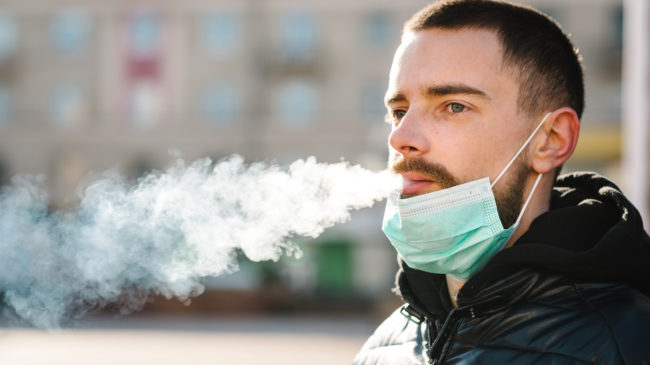The world is hoping and waiting for a COVID-19 vaccine and treatment breakthroughs. When something is viewed as a potential treatment, we’ve seen the twists and turns of remdesivir, hydroxychloroquine, favipiravir, and others garner speedy write-ups and hefty attention. Now, one hypothesis that’s raising eyebrows and drawing outright hostility in some quarters is that nicotine could potentially play a role in treating COVID-19.
In March, Dr. Konstantinos Farsalinos of the University of Patras examined Chinese data on COVID-19 patients. What he found surprised everyone who cared to look: Smokers were dramatically underrepresented relative to their share of the population. “An unusually low prevalence of current smoking was observed among hospitalized COVID-19 patients compared to the expected prevalence based on smoking prevalence in China,” he wrote.
In contrast, most public health experts think it’s obvious that smoking is a significant risk factor for COVID-19. Why wouldn’t they? Cigarettes weaken the immune system, raise the risk of respiratory infection, and are the number one cause of preventable death in America.
New York City Mayor Bill de Blasio confidently asserted that vapers and smokers were at greater risk of COVID-19. Surgeon General Jerome Adams asserted that vaping could be the reason why younger Americans were being hospitalized at higher rates than anticipated. The Food and Drug Administration (FDA) and the National Institute on Drug Abuse (NIDA) both say smoking could raise the risk of COVID-19. The FDA briefly claimed the same was true for vaping but quickly backtracked, admitting there was no evidence to back it up. NIDA hasn’t quite gotten that message.
But after looking at the data, Farsalinos concluded smoking wasn’t a risk factor for COVID-19 hospitalization. An article in the European Journal of Medicine found the same. In his initial study, Farsalsinos raised the hypothesis that nicotine could play a role in reducing the risk of COVID-19. The study received little attention outside the world of tobacco researchers. That soon changed as similar results cropped up in the United States, France, and Germany—all showing smokers to be underrepresented among COVID-19 patients.
A quarter of French adults smoke, but a study of COVID-19 patients in Paris’s Pitié-Salpêtrière hospital found just 5.3 percent were daily smokers. On April 22, French neuroscientist Jean-Pierre Changeux made headlines announcing he would be investigating the effects of administering nicotine patches to COVID-19 patients. Changeux published his hypothesis in Qeious, positing that the nicotinic acetylcholine receptor (nAChR) plays a key role in the development of COVID-19. Nicotine could potentially block coronavirus molecules attaching themselves to the receptor, preventing the development of more severe symptoms, says Changeux.
Farsalinos, for his part, has now expanded on his initial hypothesis with a peer-reviewed paper in the journal Toxicology Reports. Many of those suffering most severely from COVID-19 are victims of cytokine storms. Cytokines are proteins that help organize the body’s response against infections. Sometimes this immune system response overreacts, resulting in hyper inflammation and possibly death.
“Nicotine could maintain or restore the function of the cholinergic anti-inflammatory system and thus control the release and activity of pro-inflammatory cytokines,” writes Farsalinos. “This could prevent or suppress the cytokine storm.”
The paradoxical relationship between smoking and COVID-19 is becoming increasingly hard to ignore. Two meta-analyses recently found smokers were dramatically less likely to be hospitalized with COVID-19 than non-smokers.
Nicotine is probably the most demonized and low-status drug in the United States. Many people still mistakenly think it’s the nicotine that kills 480,000 American smokers every year. Divorced from cigarette smoke, however, nicotine is a relatively benign stimulant, with a similar risk profile to caffeine. But the drug’s intimate association with cigarettes makes many reluctant to concede it could have any redeeming benefits.
Consequently, not everyone’s happy that “la diva nicotina” could be the latest conscript in the war on COVID-19. Anti-tobacco groups seem terrified that nicotine could have any positive qualities whatsoever, or at the very least not be characterized as a severe risk factor for COVID-19.
The group Stopping Organizations and Tobacco Products (STOP) issued what to their mind was a damning indictment of both the Pitié-Salpêtrière study and Changeux’s hypothesis. STOP claims methodological flaws in the first case and accuses Changeux of having “long-standing links with the tobacco industry.”
The suggestion that nicotine’s relationship to COVID-19 is anything less than catastrophic is enough the Campaign for Tobacco-Free Kids (CTFK) to attack the French research as misleading.
The nicotine hypotheses are far from proven and there are valid critiques of the data researchers are working with. It should be an increasingly high priority to record not just the smoking status of coronavirus patients, but vaping, smokeless tobacco, and use of nicotine replacement therapies. If nicotine is the demon drug some groups claim it is, they should rejoice that scientists are putting their prejudices to the test.

